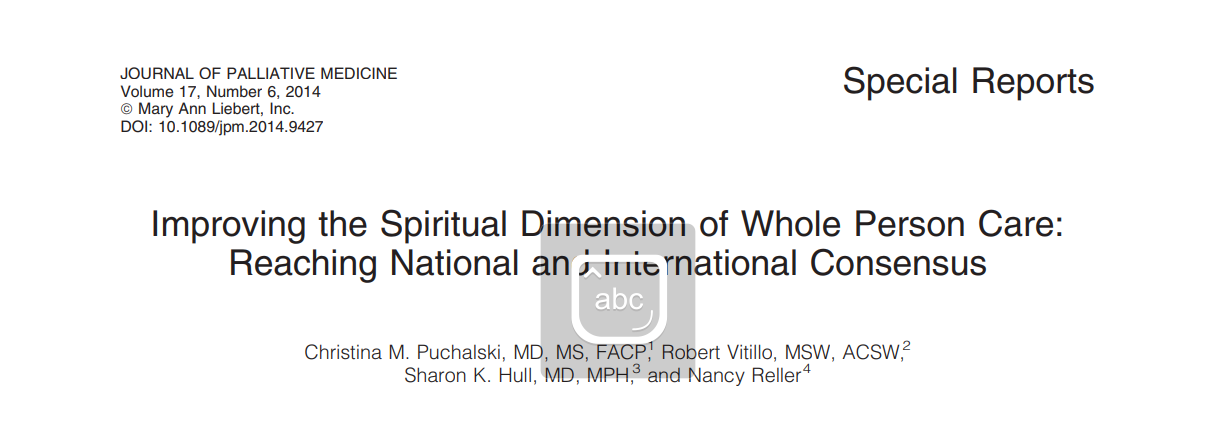Site editor:
Joaquim Cardoso MSc.
The Health Strategist — research, strategy and implementation
September 23, 2022 (timesofmalta)
JOURNAL OF PALLIATIVE MEDICINE
Christina M. Puchalski, Robert Vitillo, Sharon K. Hull, Nancy Reller
Accepted April 7, 2014.
Abstract
Two conferences, Creating More Compassionate Systems of Care (November 2012) and On Improving the Spiritual Dimension of Whole Person Care: The Transformational Role of Compassion, Love and Forgiveness in Health Care (January 2013), were convened with the goals of reaching consensus on approaches to the integration of spirituality into health care structures at all levels and development of strategies to create more compassionate systems of care.
The conferences built on the work of a 2009 consensus conference, Improving the Quality of Spiritual Care as a Dimension of Palliative Care.
Conference organizers in 2012 and 2013 aimed to identify consensus-derived care standards and recommendations for implementing them by building and expanding on the 2009 conference model of interprofessional spiritual care and its recommendations for palliative care.
The 2013 conference built on the 2012 conference to produce a set of standards and recommended strategies for integrating spiritual care across the entire health care continuum, not just palliative care.
Deliberations were based on evidence that spiritual care is a fundamental component of high-quality compassionate health care and it is most effective when it is recognized and reflected in the attitudes and actions of both patients and health care providers.
… spiritual care is a fundamental component of high-quality compassionate health care and it is most effective when it is recognized and reflected in the attitudes and actions of both patients and health care providers.
ORIGINAL PUBLICATION (excerpts)

Introduction
Although the close connection between spirituality and health has been acknowledged for centuries, a strong emphasis on science in the practice of medicine over time has caused some to question or dismiss its potential therapeutic effects.
By the early 1990s, however, hospitals and a variety of medical training programs began to recognize the role of spirituality in patient care, particularly in palliative care.1
Since that time, the professional literature reflects growing interest in and debate about this topic.2–6
Recent years have witnessed extensive growth in research on the ways in which spirituality can support health in the contexts of medicine, nursing, ethics, social work, and psychology.
This has been especially true in the field of palliative care.7–9
Data indicate that a focus on spirituality improves patients’ health outcomes, including quality of life.10–22
Conversely, negative spiritual and religious beliefs can cause distress and increase the burdens of illness.23,24
Data indicate that a focus on spirituality improves patients’ health outcomes, including quality of life.
Conversely, negative spiritual and religious beliefs can cause distress and increase the burdens of illness.
Given that global health outcomes are influenced by health care access, and considering increases in patient dissatisfaction and clinician burnout, addressing spirituality is both relevant and timely.
Moreover, as the population ages worldwide, clinicians often feel ill equipped to be present to the suffering of patients and the overwhelmingly complicated medical and social issues associated with care for patients with complex chronic issues.
Health care settings face challenges in providing compassionate care that focuses on honoring the dignity of each person.
Health care settings face challenges in providing compassionate care that focuses on honoring the dignity of each person.
Too often individuals visiting health care facilities are seen as a ‘‘disease that needs to be fixed’’ quickly and cheaply rather than as human beings with complex needs, including those of a spiritual nature.
As a result, patients feel overwhelmed by the myriad tests and pharmaceuticals offered to them as ‘‘fixes’’ instead of having the opportunity to find their own inner resources of health and healing.
Too often individuals visiting health care facilities are seen as a ‘‘disease that needs to be fixed’’ quickly and cheaply rather than as human beings with complex needs, including those of a spiritual nature.
As a result, patients feel overwhelmed by the myriad tests and pharmaceuticals offered to them as ‘‘fixes’’ instead of having the opportunity to find their own inner resources of health and healing.
In sum, they do not experience the care and compassion that relieves the burden and stress of illness — care they desire.25,26
For example, a large Canadian study reported that 96.8% of patients identified ‘‘receiving health care that is respectful and compassionate’’ as being very or extremely important.27
In sum, they (patients) do not experience the care and compassion that relieves the burden and stress of illness — care they desire.
… a large Canadian study reported that 96.8% of patients identified ‘‘receiving health care that is respectful and compassionate’’ as being very or extremely important.
Palliative care, built on the biopsychosocial-spiritual model of care, has long recognized the critical role of spirituality in the care of patients with complex, serious, and chronic illness.28
In 2004, the U.S. National Consensus Project developed eight required domains of care, among which spiritual, religious, and existential issues are included.29
Despite the comprehensive and practical orientation provided by these guidelines, clinicians still struggle with integrating spirituality into care.
In response to this challenge, the Archstone Foundation sponsored a 2009 national consensus conference, Improving Quality Spiritual Care as a Domain of Palliative Care, convened by the City of Hope and George Washington Institute for Spiritual Health (GWish), focused on spiritual care as a component of high-quality health care and, more specifically, of palliative care.
Participants from across the United States reached agreement on how spirituality can be applied to health care and made recommendations to encourage the delivery of effective spiritual care in the palliative care setting.30
Palliative care, built on the biopsychosocial-spiritual model of care, has long recognized the critical role of spirituality in the care of patients with complex, serious, and chronic illness.
Despite the comprehensive and practical orientation provided by these guidelines, clinicians still struggle with integrating spirituality into care.
Through a consensus process, participants developed the following definition of spirituality, intended to be broad and inclusive of religion:
Spirituality is the aspect of humanity that (1) refers to the way individuals seek and express meaning and purpose and (2) the way they experience their connectedness to the moment, to self, to others, to nature, and to the significant or sacred.30
Participants also noted the critical role of spirituality in relationship-centered compassionate care, recognizing that health care professionals and patients enter into a professional relationship whereby each party is potentially transformed by the other in the context of what was described as a healing relationship — i.e., where patients in the presence of a compassionate clinician can find healing in the midst of their suffering.
Leveraging the work of the National Consensus Project for Quality Palliative Care and the National Quality Forum’s Voluntary Consensus Standards for Palliative Care and End-of-Life Care,31 the 2009 …
… conference participants developed literature based categories of spiritual care and recommended approaches to implementing these concepts in practice.
Collectively, these recommendations became guidelines for improving the dimension of spiritual care in the palliative setting.30
The model and recommendations from the 2009 conference were well received in the United States and adopted by the National Voluntary Consensus Standards for Palliative and End-of-Life Care.31
Thus, by focusing on patient quality of life in the reality of their illness, health care institutions are working on quality improvements that begin to shift the focus of care from addressing only physical ailments of patients to whole person care.
Nine hospitals in California have piloted these recommendations in palliative care settings.32
Health care professionals — including physicians, nurses, social workers, chaplains, hospitalists, and educators — are being trained to integrate compassionate, relationship-centered care in their work settings by employing the interprofessional spiritual care model.
Thus, by focusing on patient quality of life in the reality of their illness, health care institutions are working on quality improvements that begin to shift the focus of care from addressing only physical ailments of patients to whole person care.
Health care professionals — including physicians, nurses, social workers, chaplains, hospitalists, and educators — are being trained to integrate compassionate, relationship-centered care in their work settings by employing the interprofessional spiritual care model.


International Consensus Definition of Spirituality
During the international conference, participants noted that across a range of countries and cultures, different terms and language are often used to describe concepts, perceptions, and views related to spirituality.
For example, although terms such as ‘‘history,’’ ‘‘transcendence,’’ and ‘‘sacred’’ were suggested as elements of spirituality, some participants objected to them because of their specific interpretations and meanings in their unique cultural contexts.
Moreover, participants discussed the importance of family in many cultures and societies as an important aspect of spirituality, emphasizing the need to recognize the importance of family in any definition of spirituality.
They asserted that in relation to health and well-being it is often the family and significant others that play the principal role in providing relationship and connectedness for patients.
… in relation to health and well-being it is often the family and significant others that play the principal role in providing relationship and connectedness for patients.
Others pointed out the difficulty of viewing spirituality in strictly abstract terms, because it is not a product but an experience that emerges from engagement in life; it is a quality that is not simply produced but emerges over time.
There was some debate about the complexity of the definition, with researchers hoping for a simplified statement that could be more amenable to research.
But others felt strongly that the definition should be broad and inclusive of the many relationships and aspects of spirituality that can be found in different cultures and societies.
Finally, unlike previous definitions, participants advocated for a sentence on how spirituality might be expressed.
Beliefs, values, traditions, and practices have been shown to impact health and health care decisions.13,15,20
After a robust and dynamic discussion with several rounds of voting, agreement was reached on the following definition of spirituality:
‘‘Spirituality is a dynamic and intrinsic aspect of humanity through which persons seek ultimate meaning, purpose, and transcendence, and experience relationship to self, family, others, community, society, nature, and the significant or sacred.
Spirituality is expressed through beliefs, values, traditions, and practices.’’
Other chapters
See the original publication

Conclusions and Next Steps
These conferences provided opportunities to explore ways to operationalize spiritual care and create global guidelines for dissemination based on the experiences and expertise of a global community.
Some general observations were made as well.
Going forward, we need to consider multigenerational views of spirituality, avoid assuming that all spiritual care should be administered by professionals in this field, and take into account regional political and other historical contexts when considering the approaches to offering spiritual care.
Participants in the 2013 conference concurred with the broad conclusions of the groups that preceded them: that health care models around the world must be transformed into systems that honor the dignity of all people (patients, families, and health care workers); that models should be focused on relationships with individuals as well as communities; and that compassion should be the driving outcome for any health delivery system.
Participants in the 2013 conference concurred with the broad conclusions of the groups that preceded them: (1) that health care models around the world must be transformed into systems that honor the dignity of all people (patients, families, and health care workers); (2) that models should be focused on relationships with individuals as well as communities; and (3) that compassion should be the driving outcome for any health delivery system.
Subsequent activities have focused on sustaining these efforts through the development of a Global Network in Spirituality and Health.
The network will be coordinated by a core group facilitated by GWish and Caritas Internationalis, and will include participants from all previous conferences.
The network will facilitate collaboration and share resources that can serve to implement the recommendations in Appendix 2.
Activities will continue to be led by the chairs of the conference working groups in research, education, clinical care, policy, and community engagement.
In addition, the Spirituality Online Education & Clinical and Resource Center (SOERCE) will develop an online learning community and share resources from the network.
What clearly emerged from both conferences was the recognition of a growing movement in spirituality and health, what some have called a silent revolution for creating more compassionate systems of care through the full integration of spirituality into health care.47
What clearly emerged from both conferences was the recognition of a growing movement in spirituality and health, what some have called a silent revolution for creating more compassionate systems of care through the full integration of spirituality into health care
Participants expressed strong enthusiasm to create a platform for this movement, through excellence in research and clinical innovation, by focusing on spirituality in professional education as essential for the formation of spiritual/humanistic-scientific practitioners, and by engaging communities and policy makers in the creation of holistic healing centers of compassionate care.
As evidenced from the years of consensus building in spirituality and health and from the activities described here, there is a strong desire, nationally and globally, to integrate spirituality more fully into health systems.
Consensus derived potential standards of care and strategies to implement these standards as described in this paper are offered as an organizing framework for this endeavor.
Research in this area is being conducted, and innovative clinical and educational models that include community involvement are being developed, in diverse clinical sites.
Our further hope is that the potential standards outlined above will be strengthened, refined, and integrated into health policies.
As echoed by all the participants in these meetings, full integration of spirituality into health care will result in more compassionate, person-centered health systems.
As echoed by all the participants in these meetings, full integration of spirituality into health care will result in more compassionate, person-centered health systems.
APPENDIX:

APPENDIX:
Recommendations Emerging from the Conferences
See the original publication.
Acknowledgments
The project team is deeply grateful to the Archstone Foundation, Long Beach, California, for its initial support of this ongoing effort.
Thanks also to the Arthur Vining Davis Foundations, Jacksonville, Florida, and to the Fetzer Institute, Kalamazoo, Michigan, for their support that made the 2012 and 2013 conferences and this project possible.
We also express gratitude to Betty Ferrell, PhD, RN, for her leadership in the 2009 conference and for her ongoing guidance in this work.
Finally, we appreciate the professional expertise of Kathi E. Hanna, MS, PhD, in the preparation of this manuscript.
References
See the original publication
About the authors & affiliations:
Christina M. Puchalski, MD, MS, FACP,1
Robert Vitillo, MSW, ACSW,2
Sharon K. Hull, MD, MPH,3 and
Nancy Reller 4
1 George Washington Institute for Spirituality and Health, The George Washington University School of Medicine and Health Sciences,
The George Washington University, Washington, DC.
2 Caritas Internationalis Delegation to the United Nations, Geneva, Switzerland.
3 Department of Community and Family Medicine,
Duke University School of Medicine, Durham, North Carolina.
4 Sojourn Communications, McLean, Virginia.
APA Citation
Puchalski, C.M., Vitillo, R., Hull, S.K., Reller, N. (2014). Improving the spiritual dimension of whole person care: Reaching national and international consensus. Journal of Palliative Medicine, 17(6), 642–656.
Originally published at https://hsrc.himmelfarb.gwu.edu.












